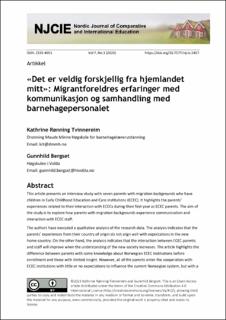| dc.contributor.author | Tvinnereim, Kathrine Rønning | |
| dc.contributor.author | Bergset, Gunnhild | |
| dc.date.accessioned | 2023-11-17T11:37:54Z | |
| dc.date.available | 2023-11-17T11:37:54Z | |
| dc.date.created | 2023-10-19T10:34:31Z | |
| dc.date.issued | 2023 | |
| dc.identifier.issn | 2535-4051 | |
| dc.identifier.uri | https://hdl.handle.net/11250/3103217 | |
| dc.description.abstract | Artikkelen presenterer en intervjustudie med syv foreldre med migrasjonsbakgrunn som deltakere. Formålet med studien er å utforske hvordan foreldre med migrasjonsbakgrunn erfarer kommunikasjon og samhandling med barnehagepersonale, med særskilt vekt på deres første år som barnehageforeldre i Norge.
Det er foretatt en kvalitativ innholdsanalyse av intervjumaterialet som viser at foreldres sprikende erfaringer fra opphavsland og nytt hjemland kan skape usikkerhet. På den andre siden indikerer analysen at samarbeidet kan bli bedre når forståelsen for det nye samfunnet øker. Det settes søkelys på skillet mellom foreldre som har noe kjennskap til den norske barnehagen før oppstart og de som bruker lengre tid til å bli trygge på at barnehagen kan yte god omsorg og være et godt pedagogisk tilbud til barn. Uavhengig av foreldrenes forkunnskaper om den norske barnehagen, forventer de ikke å medvirke, men går inn i samarbeidet med en antakelse om at de skal tilpasse seg den etablerte barnehagediskursen. Foreldrenes antakelse om at involvering ikke er forventet eller ønsket, fører til en tilbakeholdenhet overfor barnehagepersonalet. Denne tilbakeholdenheten kan også være forankret i foreldrenes skjøre tillit til barnehagepersonalet og samfunnet for øvrig, noe som medfører bekymringer for eventuelle konsekvenser av å ikke tilpasse seg, som for eksempel utvisningsvedtak eller avslag på søknad om familiegjenforening. Samtidig framgår det at åpenhet og hjelpsomhet fra andre foreldre og personalet kan minske denne bekymringen og øke symmetrien i samspillet.
Artikkelen konkluderer med at det må legges ned en ekstra innsats for at foreldre med migrasjonsbakgrunn inkluderes og informeres tilstrekkelig slik at de kan bli trygge på at barnehagen tar godt vare på barn, samt at de blir klar over at rollen som barnehageforelder gir muligheter for medvirkning og innflytelse. For å sikre at denne ekstra innsatsen blir en del av rutinene i barnehagene, bør dette kunnskapsgrunnlaget få implikasjoner for barnehagelærerutdanningen og barnehagefeltet for øvrig. | en_US |
| dc.description.abstract | Abstract
This article presents an interview study with seven parents with migration backgrounds who have children in Early Childhood Education and Care institutions (ECEC). It highlights the parents’ experiences related to their interaction with ECECs during their first year as ECEC parents. The aim of the study is to explore how parents with migration backgrounds experience communication and interaction with ECEC staff.
The authors have executed a qualitative analysis of the research data. The analysis indicates that the parents’ experiences from their country of origin do not align well with expectations in the new home country. On the other hand, the analysis indicates that the interaction between ECEC parents and staff will improve when the understanding of the new society increases. The article highlights the difference between parents with some knowledge about Norwegian ECEC institutions before enrollment and those with limited insight. However, all of the parents enter the cooperation with ECEC institutions with little or no expectations to influence the current Norwegian system, but with a will to adapt to it. The willingness to adapt might make the parents less likely to engage with the ECEC staff. This attitude is based upon insufficient trust in the ECEC institutions and in Norwegian society in general. The lack of trust creates worries about the consequences of not successfully adapting to the Norwegian ECEC system and more specifically about Norwegian authorities’ decisions regarding deportations and family reunifications. The article points out that support from ECEC staff and other ECEC parents might reduce this anxiety and further develop the interaction.
The main conclusion of this article is that an extra effort is necessary to include parents with migration backgrounds to make sure they have enough knowledge about the Norwegian ECEC institutions to be confident about their child’s well-being and aware of their own role as an important, participating part. To ensure that this effort becomes part of the routines in ECECs this knowledge base’s implications on both the ECEC teacher education and the professional field is of importance. | en_US |
| dc.language.iso | mis | en_US |
| dc.title | "Det er veldig forskjellig fra hjemlandet mitt". Migrantforeldres erfaringer med kommunikasjon og samhandling med barnehagepersonalet | en_US |
| dc.title.alternative | "Det er veldig forskjellig fra hjemlandet mitt". Migrantforeldres erfaringer med kommunikasjon og samhandling med barnehagepersonalet | en_US |
| dc.type | Peer reviewed | en_US |
| dc.type | Journal article | en_US |
| dc.description.version | publishedVersion | en_US |
| dc.source.volume | 7 | en_US |
| dc.source.journal | Nordic Journal of Comparative and International Education (NJCIE) | en_US |
| dc.source.issue | 3 | en_US |
| dc.identifier.doi | 10.7577/njcie.5457 | |
| dc.identifier.cristin | 2186231 | |
| cristin.ispublished | true | |
| cristin.fulltext | original | |
| cristin.qualitycode | 1 | |
